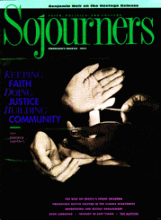December 7, 1991, was the anniversary of another tragedy besides the bombing of Pearl Harbor: the beginning of East Timor's crucifixion in 1975. East Timor, which lies at the eastern end of Indonesia's archipelago, north of Australia, had received U.N.-recognized sovereignty the year before as its Portuguese colonizers prepared to leave the country. Indonesia invaded and began the massacre that has since killed up to one-third of Timor's 700,000 inhabitants.
Then-President Gerald Ford and Secretary of State Henry Kissinger had left Indonesia just before the invasion. They were informed of it, but had more "weighty" matters on their minds. Kissinger at the time said, "The United States is involved in enough problems of greater importance overseas at present."
Of course, Indonesia had let our nuclear submarines pass through its waters during the long Cold War years. No matter that Timorese had fought with the Allies during World War II, losing 40,000 lives in that conflict. No matter that weapons our country provided Indonesia were used in the incendiary bombing that killed civilians wholesale, destroyed crops, and engendered subsequent starvation. For years, people in the United States and most of the world simply lacked interest in Timor. Indeed, even the 1991 New World Almanac has no reference whatsoever to this island nation.
A nationalist movement, Fretilin, began and continued the fight for Timorese independence, but the scorched-earth offensive against this group by the powerful Indonesian military led to Timor's annexation in July 1976. In a 1984 interview, the former acting bishop of East Timor, Martinho da Costa Lopes, called the Fretilin the symbol of national resistance against Indonesia.
Read the Full Article

